BUSN20016 Research Report: TQM in Manufacturing Supply Chains
VerifiedAdded on 2023/03/30
|18
|3524
|443
Report
AI Summary
This report delves into the factors influencing Total Quality Management (TQM) within the supply chains of manufacturing firms. It identifies the problem statement related to managing quality in SCM, emphasizing the importance of TQM for customer-oriented processes and continuous improvement. The research aims to identify and address reasons affecting TQM, focusing on understanding the supply chain's working principle, the concept of TQM, its necessity, and the factors hindering its effective implementation. Research questions address the identification, effects, and strategies to address these factors. The methodology relies on secondary data from literature reviews, employing quantitative analysis techniques. A conceptual framework is presented to illustrate the relationships between TQM, supply chain management, and the identified factors. The report anticipates providing business benefits by identifying key factors and offering insights for manufacturing firms to improve TQM in their supply chains. Desklib provides a platform for students to access similar solved assignments and past papers.

Running head: BUSN20016
BUSN20016
Name of Student
Name of University
Author Note
BUSN20016
Name of Student
Name of University
Author Note
Paraphrase This Document
Need a fresh take? Get an instant paraphrase of this document with our AI Paraphraser
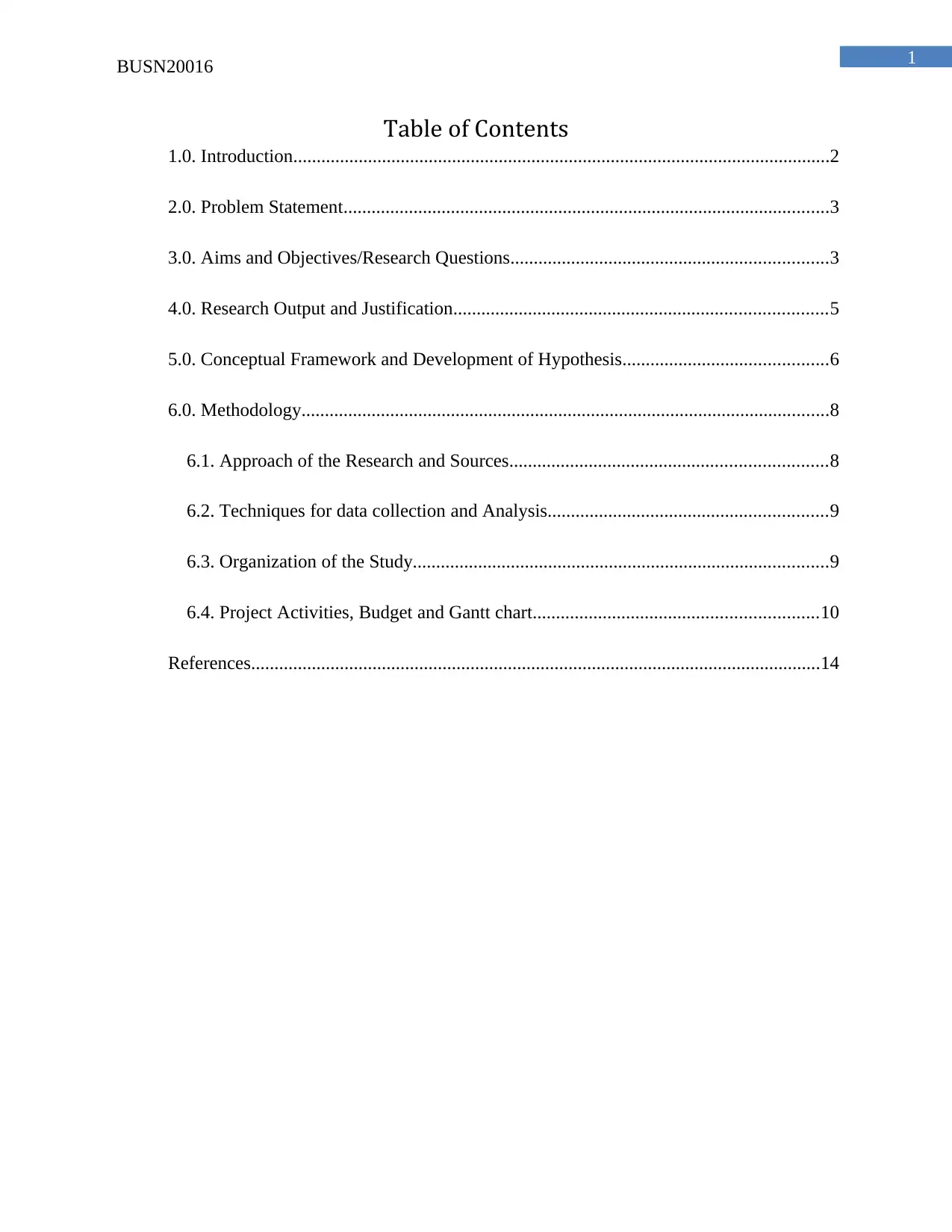
1BUSN20016
Table of Contents
1.0. Introduction...................................................................................................................2
2.0. Problem Statement........................................................................................................3
3.0. Aims and Objectives/Research Questions....................................................................3
4.0. Research Output and Justification................................................................................5
5.0. Conceptual Framework and Development of Hypothesis............................................6
6.0. Methodology.................................................................................................................8
6.1. Approach of the Research and Sources....................................................................8
6.2. Techniques for data collection and Analysis............................................................9
6.3. Organization of the Study.........................................................................................9
6.4. Project Activities, Budget and Gantt chart.............................................................10
References..........................................................................................................................14
Table of Contents
1.0. Introduction...................................................................................................................2
2.0. Problem Statement........................................................................................................3
3.0. Aims and Objectives/Research Questions....................................................................3
4.0. Research Output and Justification................................................................................5
5.0. Conceptual Framework and Development of Hypothesis............................................6
6.0. Methodology.................................................................................................................8
6.1. Approach of the Research and Sources....................................................................8
6.2. Techniques for data collection and Analysis............................................................9
6.3. Organization of the Study.........................................................................................9
6.4. Project Activities, Budget and Gantt chart.............................................................10
References..........................................................................................................................14
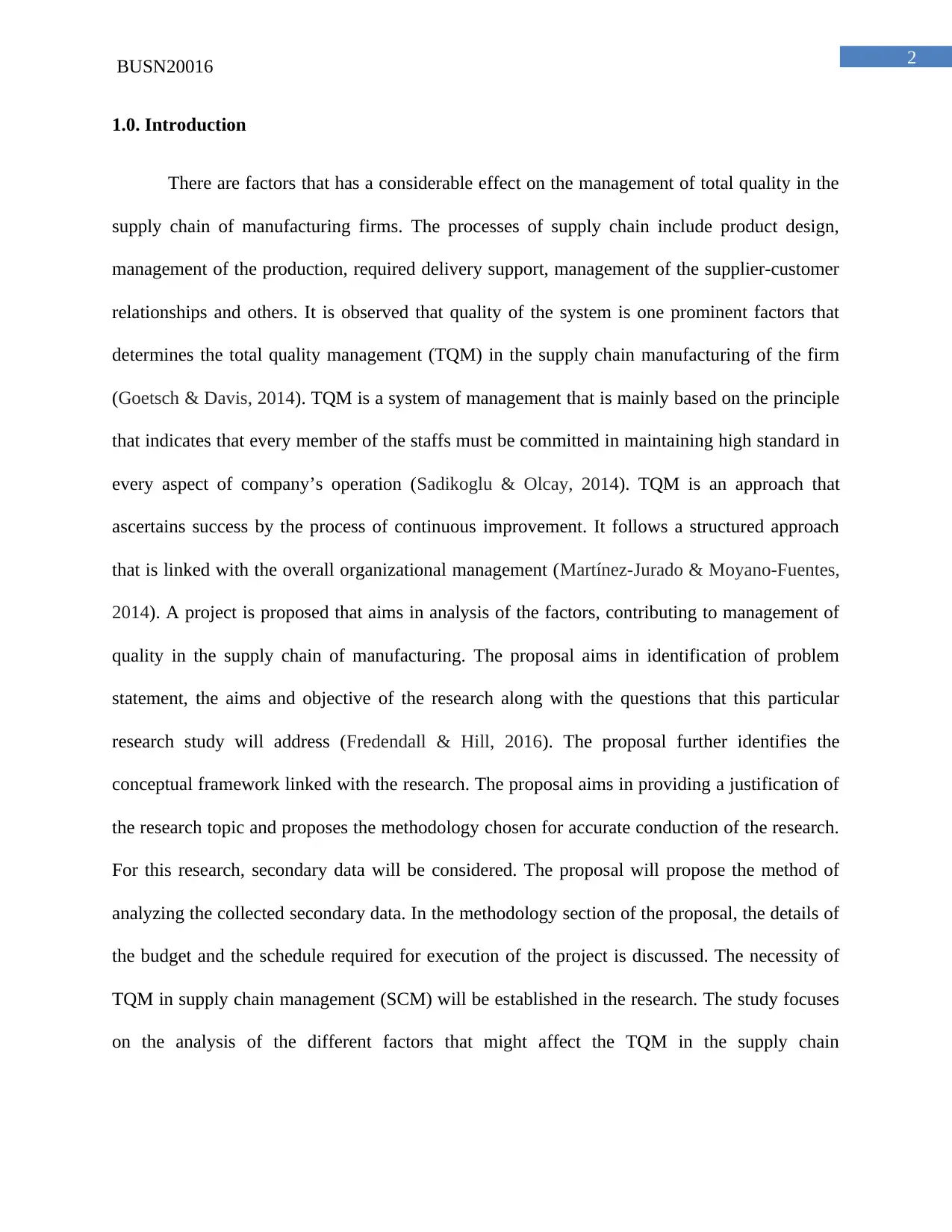
2BUSN20016
1.0. Introduction
There are factors that has a considerable effect on the management of total quality in the
supply chain of manufacturing firms. The processes of supply chain include product design,
management of the production, required delivery support, management of the supplier-customer
relationships and others. It is observed that quality of the system is one prominent factors that
determines the total quality management (TQM) in the supply chain manufacturing of the firm
(Goetsch & Davis, 2014). TQM is a system of management that is mainly based on the principle
that indicates that every member of the staffs must be committed in maintaining high standard in
every aspect of company’s operation (Sadikoglu & Olcay, 2014). TQM is an approach that
ascertains success by the process of continuous improvement. It follows a structured approach
that is linked with the overall organizational management (Martínez-Jurado & Moyano-Fuentes,
2014). A project is proposed that aims in analysis of the factors, contributing to management of
quality in the supply chain of manufacturing. The proposal aims in identification of problem
statement, the aims and objective of the research along with the questions that this particular
research study will address (Fredendall & Hill, 2016). The proposal further identifies the
conceptual framework linked with the research. The proposal aims in providing a justification of
the research topic and proposes the methodology chosen for accurate conduction of the research.
For this research, secondary data will be considered. The proposal will propose the method of
analyzing the collected secondary data. In the methodology section of the proposal, the details of
the budget and the schedule required for execution of the project is discussed. The necessity of
TQM in supply chain management (SCM) will be established in the research. The study focuses
on the analysis of the different factors that might affect the TQM in the supply chain
1.0. Introduction
There are factors that has a considerable effect on the management of total quality in the
supply chain of manufacturing firms. The processes of supply chain include product design,
management of the production, required delivery support, management of the supplier-customer
relationships and others. It is observed that quality of the system is one prominent factors that
determines the total quality management (TQM) in the supply chain manufacturing of the firm
(Goetsch & Davis, 2014). TQM is a system of management that is mainly based on the principle
that indicates that every member of the staffs must be committed in maintaining high standard in
every aspect of company’s operation (Sadikoglu & Olcay, 2014). TQM is an approach that
ascertains success by the process of continuous improvement. It follows a structured approach
that is linked with the overall organizational management (Martínez-Jurado & Moyano-Fuentes,
2014). A project is proposed that aims in analysis of the factors, contributing to management of
quality in the supply chain of manufacturing. The proposal aims in identification of problem
statement, the aims and objective of the research along with the questions that this particular
research study will address (Fredendall & Hill, 2016). The proposal further identifies the
conceptual framework linked with the research. The proposal aims in providing a justification of
the research topic and proposes the methodology chosen for accurate conduction of the research.
For this research, secondary data will be considered. The proposal will propose the method of
analyzing the collected secondary data. In the methodology section of the proposal, the details of
the budget and the schedule required for execution of the project is discussed. The necessity of
TQM in supply chain management (SCM) will be established in the research. The study focuses
on the analysis of the different factors that might affect the TQM in the supply chain
⊘ This is a preview!⊘
Do you want full access?
Subscribe today to unlock all pages.

Trusted by 1+ million students worldwide
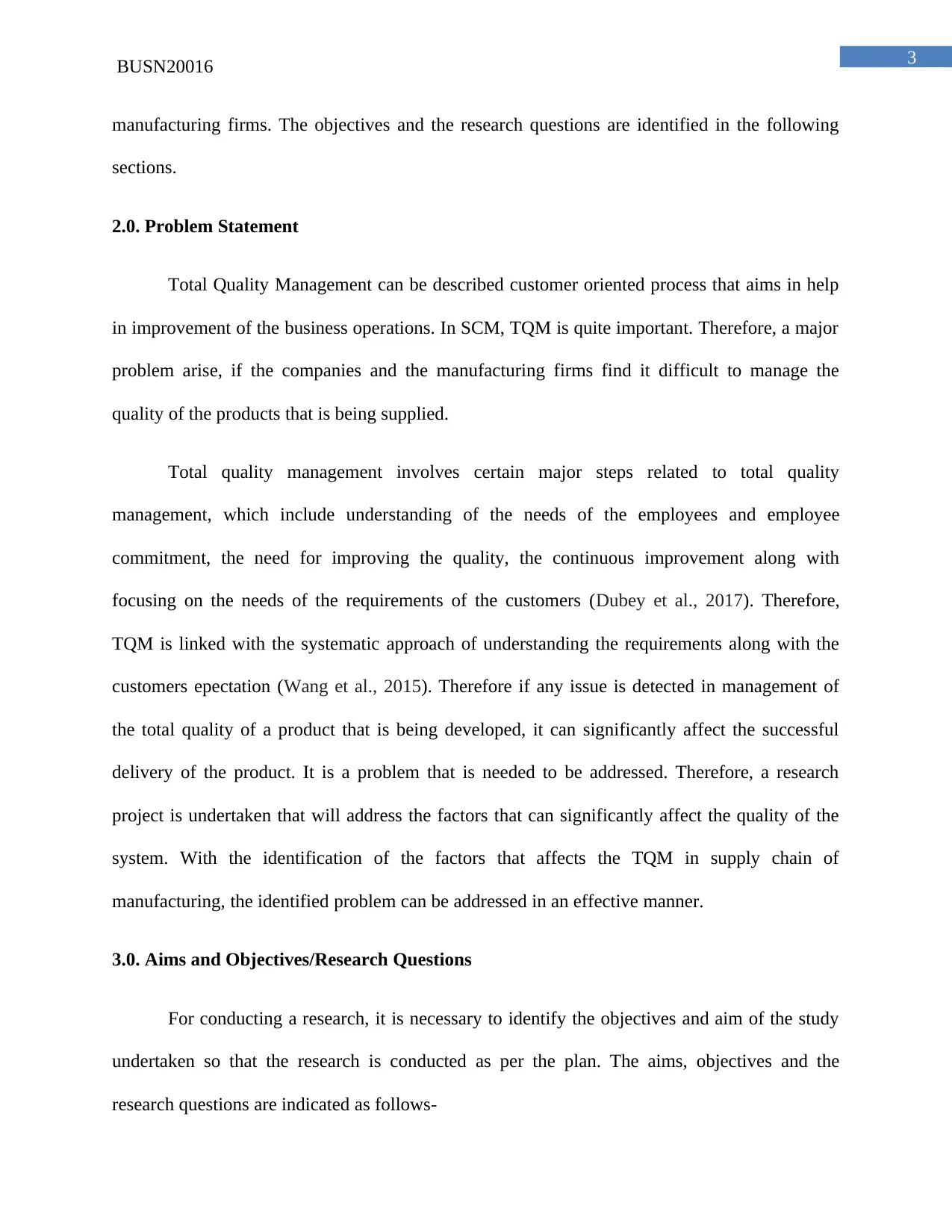
3BUSN20016
manufacturing firms. The objectives and the research questions are identified in the following
sections.
2.0. Problem Statement
Total Quality Management can be described customer oriented process that aims in help
in improvement of the business operations. In SCM, TQM is quite important. Therefore, a major
problem arise, if the companies and the manufacturing firms find it difficult to manage the
quality of the products that is being supplied.
Total quality management involves certain major steps related to total quality
management, which include understanding of the needs of the employees and employee
commitment, the need for improving the quality, the continuous improvement along with
focusing on the needs of the requirements of the customers (Dubey et al., 2017). Therefore,
TQM is linked with the systematic approach of understanding the requirements along with the
customers epectation (Wang et al., 2015). Therefore if any issue is detected in management of
the total quality of a product that is being developed, it can significantly affect the successful
delivery of the product. It is a problem that is needed to be addressed. Therefore, a research
project is undertaken that will address the factors that can significantly affect the quality of the
system. With the identification of the factors that affects the TQM in supply chain of
manufacturing, the identified problem can be addressed in an effective manner.
3.0. Aims and Objectives/Research Questions
For conducting a research, it is necessary to identify the objectives and aim of the study
undertaken so that the research is conducted as per the plan. The aims, objectives and the
research questions are indicated as follows-
manufacturing firms. The objectives and the research questions are identified in the following
sections.
2.0. Problem Statement
Total Quality Management can be described customer oriented process that aims in help
in improvement of the business operations. In SCM, TQM is quite important. Therefore, a major
problem arise, if the companies and the manufacturing firms find it difficult to manage the
quality of the products that is being supplied.
Total quality management involves certain major steps related to total quality
management, which include understanding of the needs of the employees and employee
commitment, the need for improving the quality, the continuous improvement along with
focusing on the needs of the requirements of the customers (Dubey et al., 2017). Therefore,
TQM is linked with the systematic approach of understanding the requirements along with the
customers epectation (Wang et al., 2015). Therefore if any issue is detected in management of
the total quality of a product that is being developed, it can significantly affect the successful
delivery of the product. It is a problem that is needed to be addressed. Therefore, a research
project is undertaken that will address the factors that can significantly affect the quality of the
system. With the identification of the factors that affects the TQM in supply chain of
manufacturing, the identified problem can be addressed in an effective manner.
3.0. Aims and Objectives/Research Questions
For conducting a research, it is necessary to identify the objectives and aim of the study
undertaken so that the research is conducted as per the plan. The aims, objectives and the
research questions are indicated as follows-
Paraphrase This Document
Need a fresh take? Get an instant paraphrase of this document with our AI Paraphraser
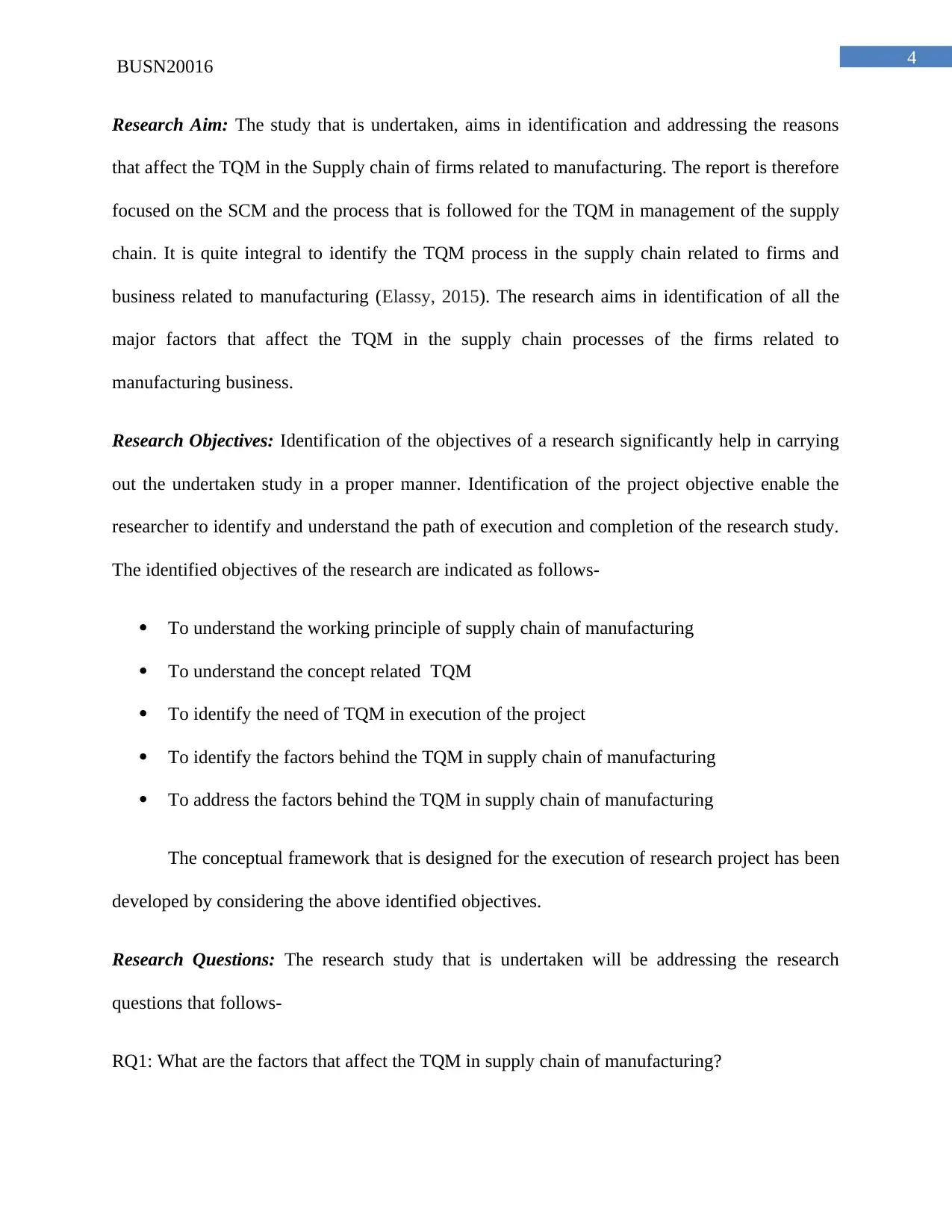
4BUSN20016
Research Aim: The study that is undertaken, aims in identification and addressing the reasons
that affect the TQM in the Supply chain of firms related to manufacturing. The report is therefore
focused on the SCM and the process that is followed for the TQM in management of the supply
chain. It is quite integral to identify the TQM process in the supply chain related to firms and
business related to manufacturing (Elassy, 2015). The research aims in identification of all the
major factors that affect the TQM in the supply chain processes of the firms related to
manufacturing business.
Research Objectives: Identification of the objectives of a research significantly help in carrying
out the undertaken study in a proper manner. Identification of the project objective enable the
researcher to identify and understand the path of execution and completion of the research study.
The identified objectives of the research are indicated as follows-
To understand the working principle of supply chain of manufacturing
To understand the concept related TQM
To identify the need of TQM in execution of the project
To identify the factors behind the TQM in supply chain of manufacturing
To address the factors behind the TQM in supply chain of manufacturing
The conceptual framework that is designed for the execution of research project has been
developed by considering the above identified objectives.
Research Questions: The research study that is undertaken will be addressing the research
questions that follows-
RQ1: What are the factors that affect the TQM in supply chain of manufacturing?
Research Aim: The study that is undertaken, aims in identification and addressing the reasons
that affect the TQM in the Supply chain of firms related to manufacturing. The report is therefore
focused on the SCM and the process that is followed for the TQM in management of the supply
chain. It is quite integral to identify the TQM process in the supply chain related to firms and
business related to manufacturing (Elassy, 2015). The research aims in identification of all the
major factors that affect the TQM in the supply chain processes of the firms related to
manufacturing business.
Research Objectives: Identification of the objectives of a research significantly help in carrying
out the undertaken study in a proper manner. Identification of the project objective enable the
researcher to identify and understand the path of execution and completion of the research study.
The identified objectives of the research are indicated as follows-
To understand the working principle of supply chain of manufacturing
To understand the concept related TQM
To identify the need of TQM in execution of the project
To identify the factors behind the TQM in supply chain of manufacturing
To address the factors behind the TQM in supply chain of manufacturing
The conceptual framework that is designed for the execution of research project has been
developed by considering the above identified objectives.
Research Questions: The research study that is undertaken will be addressing the research
questions that follows-
RQ1: What are the factors that affect the TQM in supply chain of manufacturing?
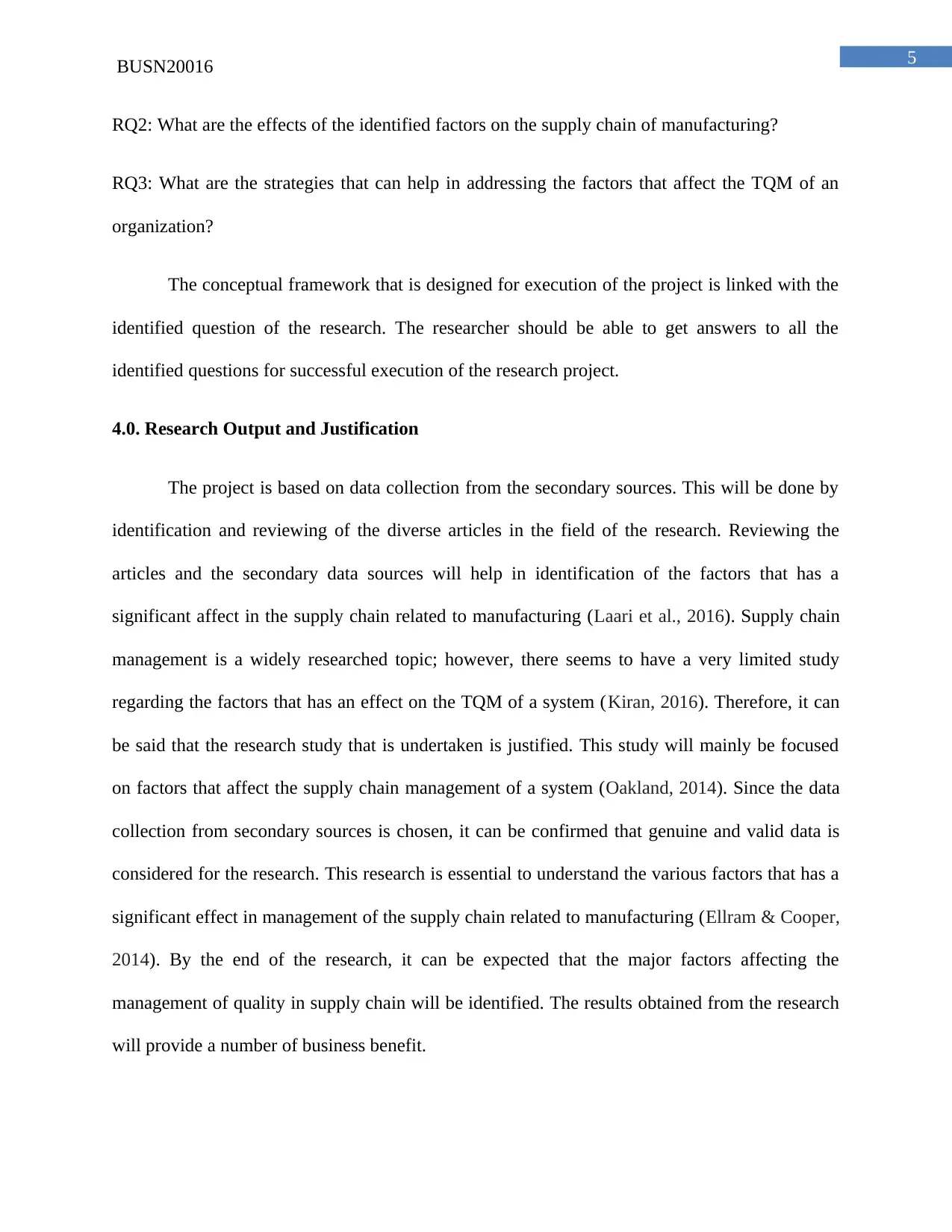
5BUSN20016
RQ2: What are the effects of the identified factors on the supply chain of manufacturing?
RQ3: What are the strategies that can help in addressing the factors that affect the TQM of an
organization?
The conceptual framework that is designed for execution of the project is linked with the
identified question of the research. The researcher should be able to get answers to all the
identified questions for successful execution of the research project.
4.0. Research Output and Justification
The project is based on data collection from the secondary sources. This will be done by
identification and reviewing of the diverse articles in the field of the research. Reviewing the
articles and the secondary data sources will help in identification of the factors that has a
significant affect in the supply chain related to manufacturing (Laari et al., 2016). Supply chain
management is a widely researched topic; however, there seems to have a very limited study
regarding the factors that has an effect on the TQM of a system (Kiran, 2016). Therefore, it can
be said that the research study that is undertaken is justified. This study will mainly be focused
on factors that affect the supply chain management of a system (Oakland, 2014). Since the data
collection from secondary sources is chosen, it can be confirmed that genuine and valid data is
considered for the research. This research is essential to understand the various factors that has a
significant effect in management of the supply chain related to manufacturing (Ellram & Cooper,
2014). By the end of the research, it can be expected that the major factors affecting the
management of quality in supply chain will be identified. The results obtained from the research
will provide a number of business benefit.
RQ2: What are the effects of the identified factors on the supply chain of manufacturing?
RQ3: What are the strategies that can help in addressing the factors that affect the TQM of an
organization?
The conceptual framework that is designed for execution of the project is linked with the
identified question of the research. The researcher should be able to get answers to all the
identified questions for successful execution of the research project.
4.0. Research Output and Justification
The project is based on data collection from the secondary sources. This will be done by
identification and reviewing of the diverse articles in the field of the research. Reviewing the
articles and the secondary data sources will help in identification of the factors that has a
significant affect in the supply chain related to manufacturing (Laari et al., 2016). Supply chain
management is a widely researched topic; however, there seems to have a very limited study
regarding the factors that has an effect on the TQM of a system (Kiran, 2016). Therefore, it can
be said that the research study that is undertaken is justified. This study will mainly be focused
on factors that affect the supply chain management of a system (Oakland, 2014). Since the data
collection from secondary sources is chosen, it can be confirmed that genuine and valid data is
considered for the research. This research is essential to understand the various factors that has a
significant effect in management of the supply chain related to manufacturing (Ellram & Cooper,
2014). By the end of the research, it can be expected that the major factors affecting the
management of quality in supply chain will be identified. The results obtained from the research
will provide a number of business benefit.
⊘ This is a preview!⊘
Do you want full access?
Subscribe today to unlock all pages.

Trusted by 1+ million students worldwide
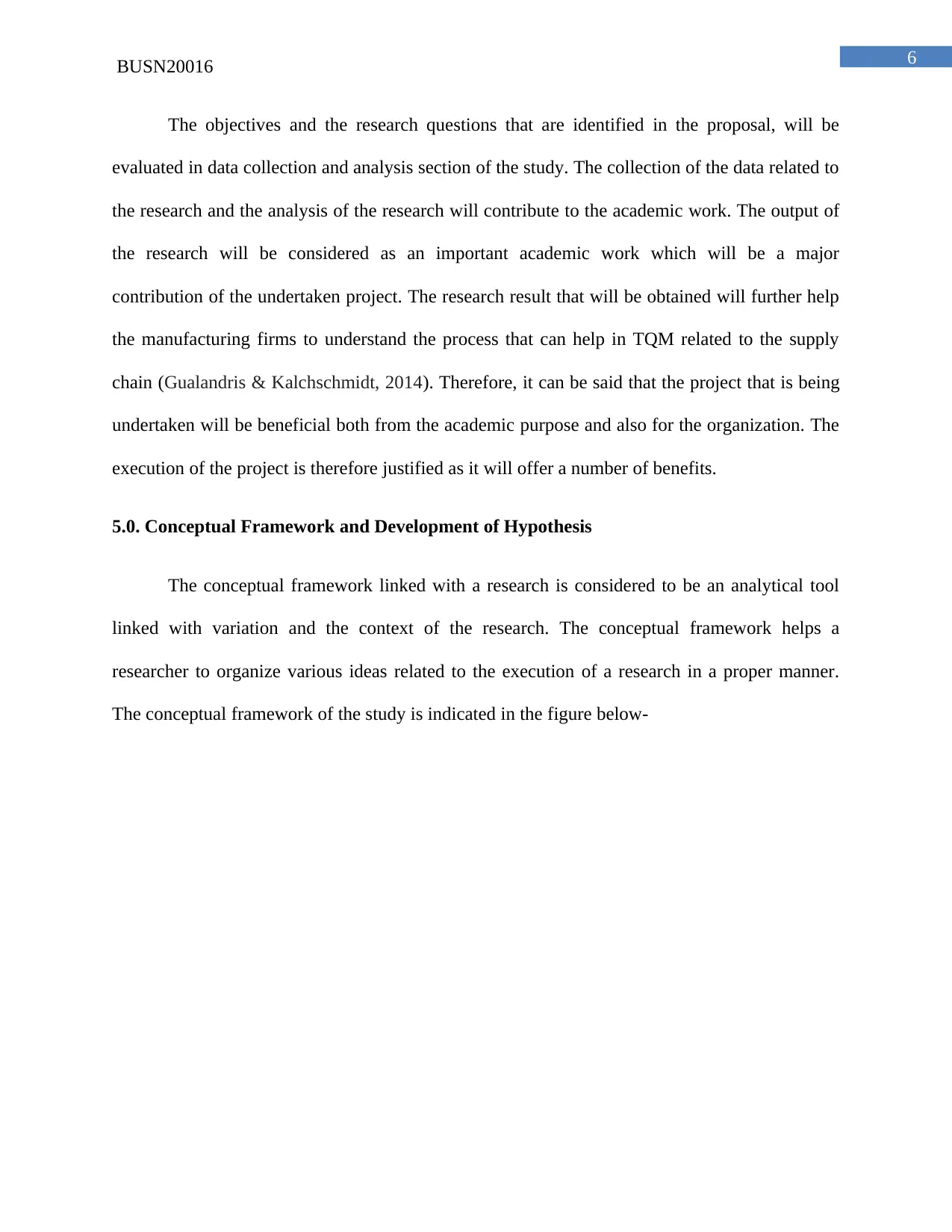
6BUSN20016
The objectives and the research questions that are identified in the proposal, will be
evaluated in data collection and analysis section of the study. The collection of the data related to
the research and the analysis of the research will contribute to the academic work. The output of
the research will be considered as an important academic work which will be a major
contribution of the undertaken project. The research result that will be obtained will further help
the manufacturing firms to understand the process that can help in TQM related to the supply
chain (Gualandris & Kalchschmidt, 2014). Therefore, it can be said that the project that is being
undertaken will be beneficial both from the academic purpose and also for the organization. The
execution of the project is therefore justified as it will offer a number of benefits.
5.0. Conceptual Framework and Development of Hypothesis
The conceptual framework linked with a research is considered to be an analytical tool
linked with variation and the context of the research. The conceptual framework helps a
researcher to organize various ideas related to the execution of a research in a proper manner.
The conceptual framework of the study is indicated in the figure below-
The objectives and the research questions that are identified in the proposal, will be
evaluated in data collection and analysis section of the study. The collection of the data related to
the research and the analysis of the research will contribute to the academic work. The output of
the research will be considered as an important academic work which will be a major
contribution of the undertaken project. The research result that will be obtained will further help
the manufacturing firms to understand the process that can help in TQM related to the supply
chain (Gualandris & Kalchschmidt, 2014). Therefore, it can be said that the project that is being
undertaken will be beneficial both from the academic purpose and also for the organization. The
execution of the project is therefore justified as it will offer a number of benefits.
5.0. Conceptual Framework and Development of Hypothesis
The conceptual framework linked with a research is considered to be an analytical tool
linked with variation and the context of the research. The conceptual framework helps a
researcher to organize various ideas related to the execution of a research in a proper manner.
The conceptual framework of the study is indicated in the figure below-
Paraphrase This Document
Need a fresh take? Get an instant paraphrase of this document with our AI Paraphraser
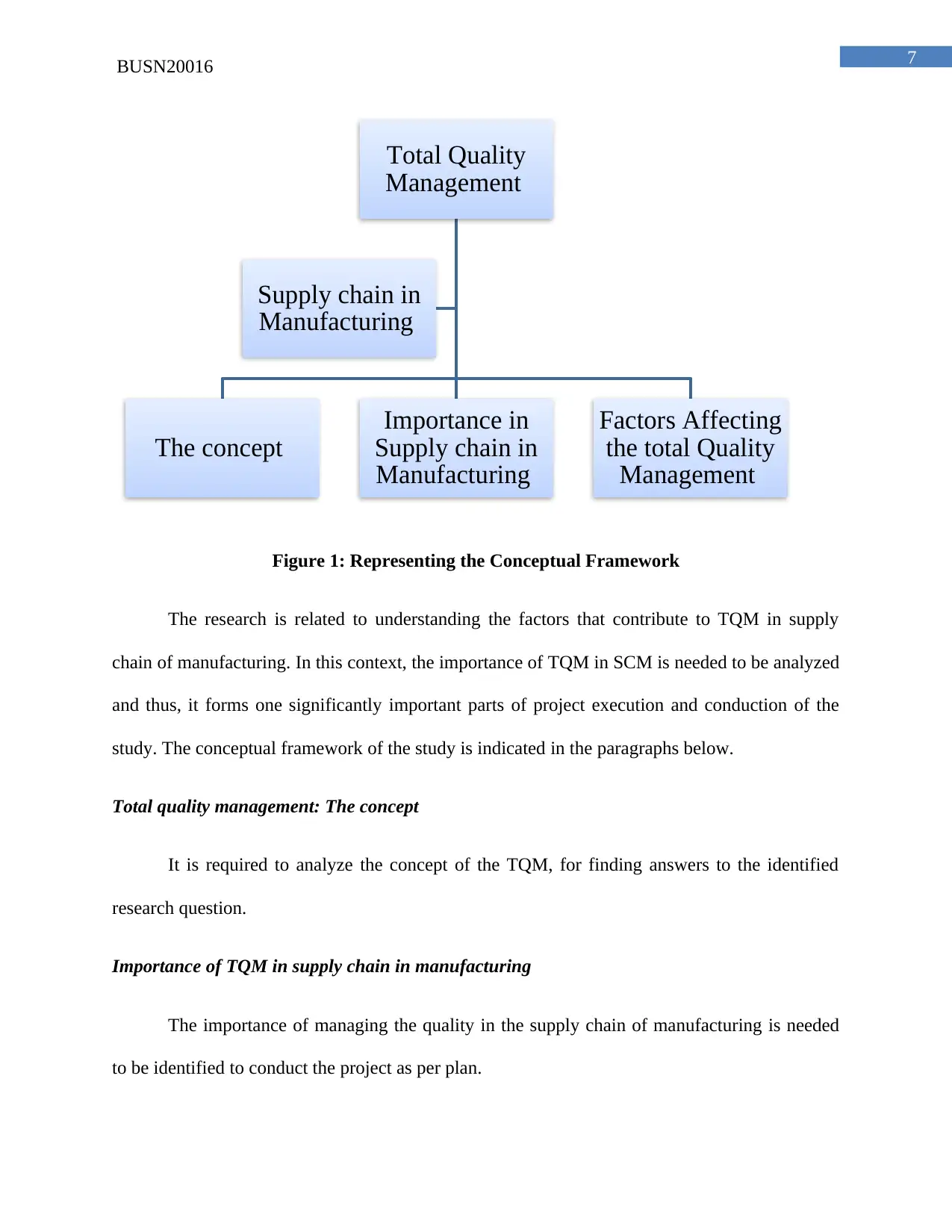
7BUSN20016
Figure 1: Representing the Conceptual Framework
The research is related to understanding the factors that contribute to TQM in supply
chain of manufacturing. In this context, the importance of TQM in SCM is needed to be analyzed
and thus, it forms one significantly important parts of project execution and conduction of the
study. The conceptual framework of the study is indicated in the paragraphs below.
Total quality management: The concept
It is required to analyze the concept of the TQM, for finding answers to the identified
research question.
Importance of TQM in supply chain in manufacturing
The importance of managing the quality in the supply chain of manufacturing is needed
to be identified to conduct the project as per plan.
Total Quality
Management
The concept
Importance in
Supply chain in
Manufacturing
Factors Affecting
the total Quality
Management
Supply chain in
Manufacturing
Figure 1: Representing the Conceptual Framework
The research is related to understanding the factors that contribute to TQM in supply
chain of manufacturing. In this context, the importance of TQM in SCM is needed to be analyzed
and thus, it forms one significantly important parts of project execution and conduction of the
study. The conceptual framework of the study is indicated in the paragraphs below.
Total quality management: The concept
It is required to analyze the concept of the TQM, for finding answers to the identified
research question.
Importance of TQM in supply chain in manufacturing
The importance of managing the quality in the supply chain of manufacturing is needed
to be identified to conduct the project as per plan.
Total Quality
Management
The concept
Importance in
Supply chain in
Manufacturing
Factors Affecting
the total Quality
Management
Supply chain in
Manufacturing
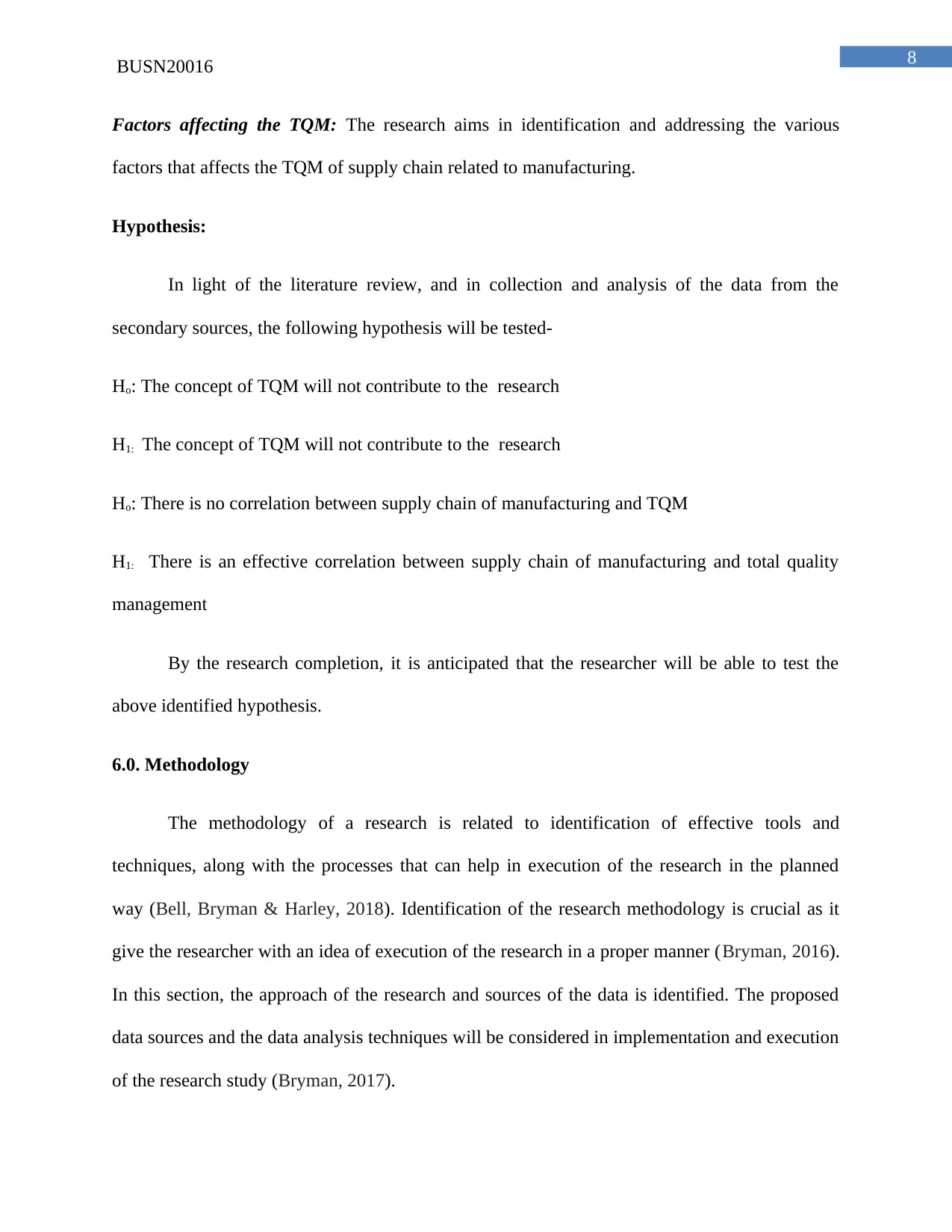
8BUSN20016
Factors affecting the TQM: The research aims in identification and addressing the various
factors that affects the TQM of supply chain related to manufacturing.
Hypothesis:
In light of the literature review, and in collection and analysis of the data from the
secondary sources, the following hypothesis will be tested-
Ho: The concept of TQM will not contribute to the research
H1: The concept of TQM will not contribute to the research
Ho: There is no correlation between supply chain of manufacturing and TQM
H1: There is an effective correlation between supply chain of manufacturing and total quality
management
By the research completion, it is anticipated that the researcher will be able to test the
above identified hypothesis.
6.0. Methodology
The methodology of a research is related to identification of effective tools and
techniques, along with the processes that can help in execution of the research in the planned
way (Bell, Bryman & Harley, 2018). Identification of the research methodology is crucial as it
give the researcher with an idea of execution of the research in a proper manner (Bryman, 2016).
In this section, the approach of the research and sources of the data is identified. The proposed
data sources and the data analysis techniques will be considered in implementation and execution
of the research study (Bryman, 2017).
Factors affecting the TQM: The research aims in identification and addressing the various
factors that affects the TQM of supply chain related to manufacturing.
Hypothesis:
In light of the literature review, and in collection and analysis of the data from the
secondary sources, the following hypothesis will be tested-
Ho: The concept of TQM will not contribute to the research
H1: The concept of TQM will not contribute to the research
Ho: There is no correlation between supply chain of manufacturing and TQM
H1: There is an effective correlation between supply chain of manufacturing and total quality
management
By the research completion, it is anticipated that the researcher will be able to test the
above identified hypothesis.
6.0. Methodology
The methodology of a research is related to identification of effective tools and
techniques, along with the processes that can help in execution of the research in the planned
way (Bell, Bryman & Harley, 2018). Identification of the research methodology is crucial as it
give the researcher with an idea of execution of the research in a proper manner (Bryman, 2016).
In this section, the approach of the research and sources of the data is identified. The proposed
data sources and the data analysis techniques will be considered in implementation and execution
of the research study (Bryman, 2017).
⊘ This is a preview!⊘
Do you want full access?
Subscribe today to unlock all pages.

Trusted by 1+ million students worldwide
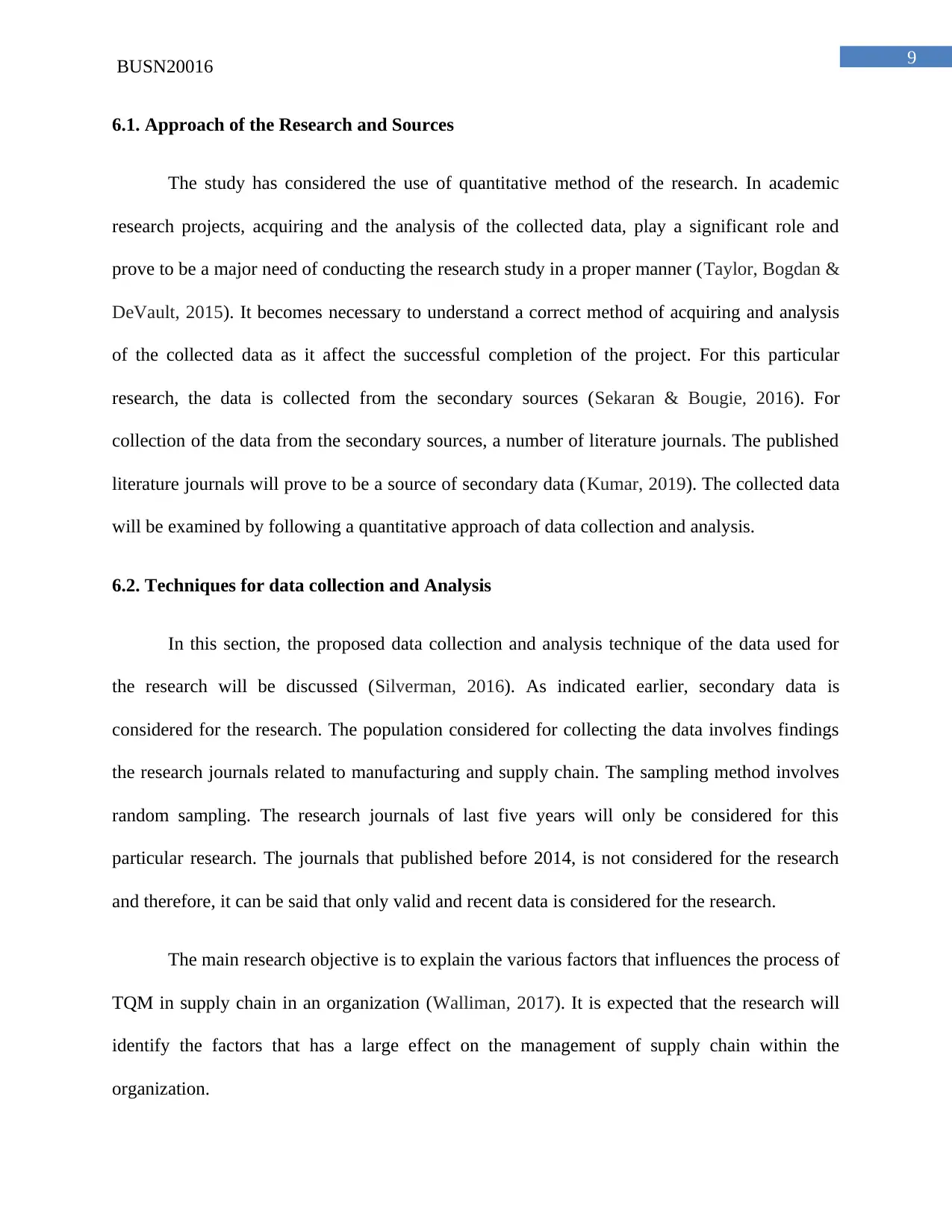
9BUSN20016
6.1. Approach of the Research and Sources
The study has considered the use of quantitative method of the research. In academic
research projects, acquiring and the analysis of the collected data, play a significant role and
prove to be a major need of conducting the research study in a proper manner (Taylor, Bogdan &
DeVault, 2015). It becomes necessary to understand a correct method of acquiring and analysis
of the collected data as it affect the successful completion of the project. For this particular
research, the data is collected from the secondary sources (Sekaran & Bougie, 2016). For
collection of the data from the secondary sources, a number of literature journals. The published
literature journals will prove to be a source of secondary data (Kumar, 2019). The collected data
will be examined by following a quantitative approach of data collection and analysis.
6.2. Techniques for data collection and Analysis
In this section, the proposed data collection and analysis technique of the data used for
the research will be discussed (Silverman, 2016). As indicated earlier, secondary data is
considered for the research. The population considered for collecting the data involves findings
the research journals related to manufacturing and supply chain. The sampling method involves
random sampling. The research journals of last five years will only be considered for this
particular research. The journals that published before 2014, is not considered for the research
and therefore, it can be said that only valid and recent data is considered for the research.
The main research objective is to explain the various factors that influences the process of
TQM in supply chain in an organization (Walliman, 2017). It is expected that the research will
identify the factors that has a large effect on the management of supply chain within the
organization.
6.1. Approach of the Research and Sources
The study has considered the use of quantitative method of the research. In academic
research projects, acquiring and the analysis of the collected data, play a significant role and
prove to be a major need of conducting the research study in a proper manner (Taylor, Bogdan &
DeVault, 2015). It becomes necessary to understand a correct method of acquiring and analysis
of the collected data as it affect the successful completion of the project. For this particular
research, the data is collected from the secondary sources (Sekaran & Bougie, 2016). For
collection of the data from the secondary sources, a number of literature journals. The published
literature journals will prove to be a source of secondary data (Kumar, 2019). The collected data
will be examined by following a quantitative approach of data collection and analysis.
6.2. Techniques for data collection and Analysis
In this section, the proposed data collection and analysis technique of the data used for
the research will be discussed (Silverman, 2016). As indicated earlier, secondary data is
considered for the research. The population considered for collecting the data involves findings
the research journals related to manufacturing and supply chain. The sampling method involves
random sampling. The research journals of last five years will only be considered for this
particular research. The journals that published before 2014, is not considered for the research
and therefore, it can be said that only valid and recent data is considered for the research.
The main research objective is to explain the various factors that influences the process of
TQM in supply chain in an organization (Walliman, 2017). It is expected that the research will
identify the factors that has a large effect on the management of supply chain within the
organization.
Paraphrase This Document
Need a fresh take? Get an instant paraphrase of this document with our AI Paraphraser
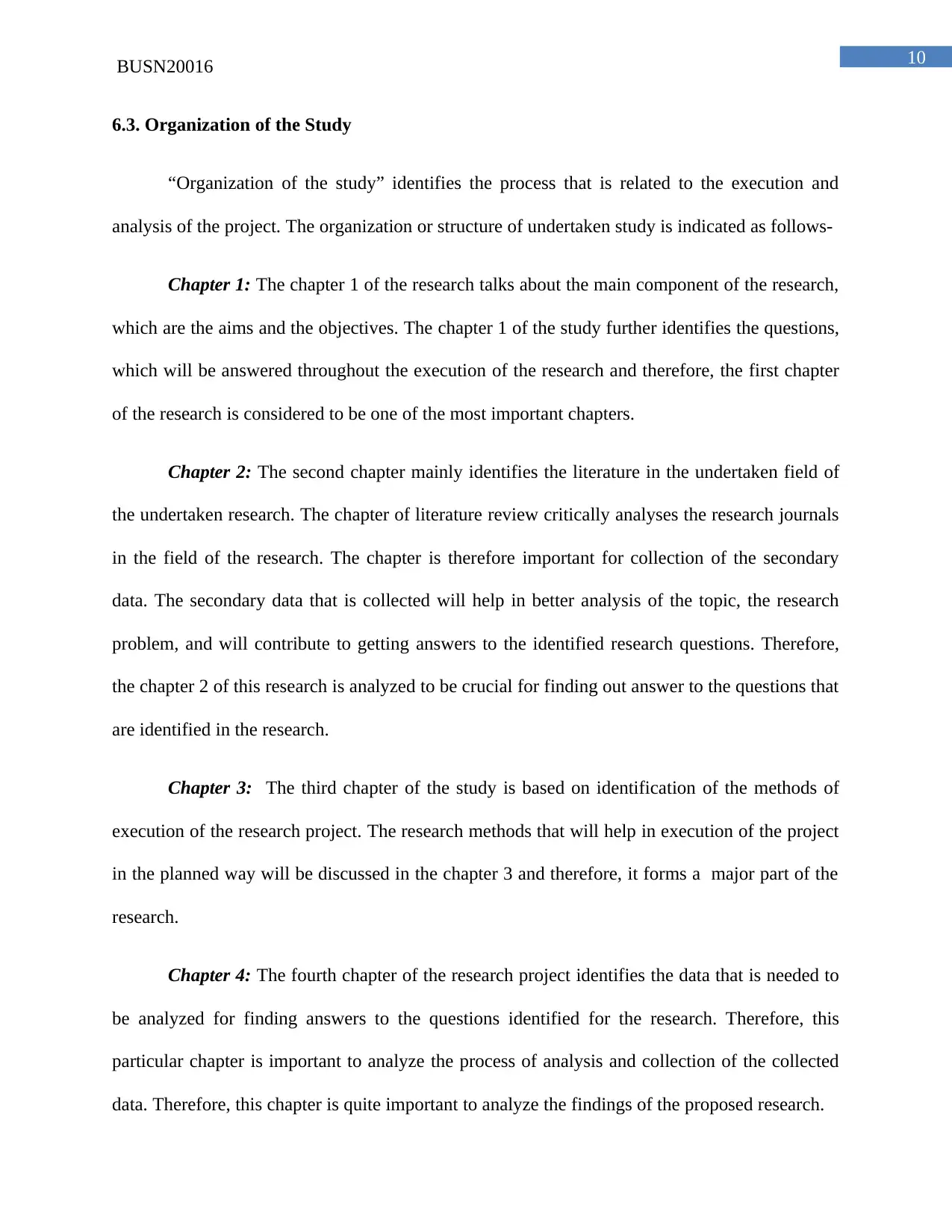
10BUSN20016
6.3. Organization of the Study
“Organization of the study” identifies the process that is related to the execution and
analysis of the project. The organization or structure of undertaken study is indicated as follows-
Chapter 1: The chapter 1 of the research talks about the main component of the research,
which are the aims and the objectives. The chapter 1 of the study further identifies the questions,
which will be answered throughout the execution of the research and therefore, the first chapter
of the research is considered to be one of the most important chapters.
Chapter 2: The second chapter mainly identifies the literature in the undertaken field of
the undertaken research. The chapter of literature review critically analyses the research journals
in the field of the research. The chapter is therefore important for collection of the secondary
data. The secondary data that is collected will help in better analysis of the topic, the research
problem, and will contribute to getting answers to the identified research questions. Therefore,
the chapter 2 of this research is analyzed to be crucial for finding out answer to the questions that
are identified in the research.
Chapter 3: The third chapter of the study is based on identification of the methods of
execution of the research project. The research methods that will help in execution of the project
in the planned way will be discussed in the chapter 3 and therefore, it forms a major part of the
research.
Chapter 4: The fourth chapter of the research project identifies the data that is needed to
be analyzed for finding answers to the questions identified for the research. Therefore, this
particular chapter is important to analyze the process of analysis and collection of the collected
data. Therefore, this chapter is quite important to analyze the findings of the proposed research.
6.3. Organization of the Study
“Organization of the study” identifies the process that is related to the execution and
analysis of the project. The organization or structure of undertaken study is indicated as follows-
Chapter 1: The chapter 1 of the research talks about the main component of the research,
which are the aims and the objectives. The chapter 1 of the study further identifies the questions,
which will be answered throughout the execution of the research and therefore, the first chapter
of the research is considered to be one of the most important chapters.
Chapter 2: The second chapter mainly identifies the literature in the undertaken field of
the undertaken research. The chapter of literature review critically analyses the research journals
in the field of the research. The chapter is therefore important for collection of the secondary
data. The secondary data that is collected will help in better analysis of the topic, the research
problem, and will contribute to getting answers to the identified research questions. Therefore,
the chapter 2 of this research is analyzed to be crucial for finding out answer to the questions that
are identified in the research.
Chapter 3: The third chapter of the study is based on identification of the methods of
execution of the research project. The research methods that will help in execution of the project
in the planned way will be discussed in the chapter 3 and therefore, it forms a major part of the
research.
Chapter 4: The fourth chapter of the research project identifies the data that is needed to
be analyzed for finding answers to the questions identified for the research. Therefore, this
particular chapter is important to analyze the process of analysis and collection of the collected
data. Therefore, this chapter is quite important to analyze the findings of the proposed research.
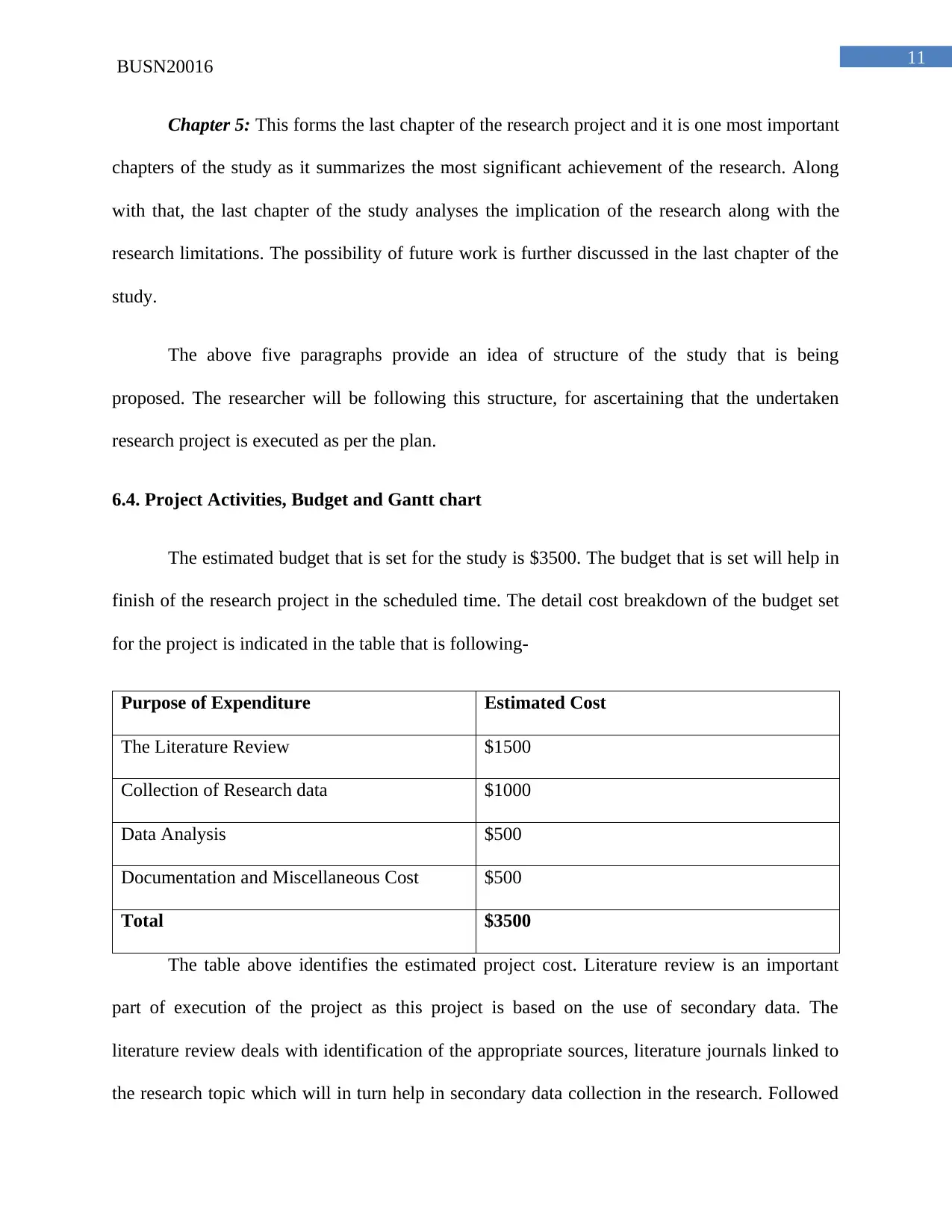
11BUSN20016
Chapter 5: This forms the last chapter of the research project and it is one most important
chapters of the study as it summarizes the most significant achievement of the research. Along
with that, the last chapter of the study analyses the implication of the research along with the
research limitations. The possibility of future work is further discussed in the last chapter of the
study.
The above five paragraphs provide an idea of structure of the study that is being
proposed. The researcher will be following this structure, for ascertaining that the undertaken
research project is executed as per the plan.
6.4. Project Activities, Budget and Gantt chart
The estimated budget that is set for the study is $3500. The budget that is set will help in
finish of the research project in the scheduled time. The detail cost breakdown of the budget set
for the project is indicated in the table that is following-
Purpose of Expenditure Estimated Cost
The Literature Review $1500
Collection of Research data $1000
Data Analysis $500
Documentation and Miscellaneous Cost $500
Total $3500
The table above identifies the estimated project cost. Literature review is an important
part of execution of the project as this project is based on the use of secondary data. The
literature review deals with identification of the appropriate sources, literature journals linked to
the research topic which will in turn help in secondary data collection in the research. Followed
Chapter 5: This forms the last chapter of the research project and it is one most important
chapters of the study as it summarizes the most significant achievement of the research. Along
with that, the last chapter of the study analyses the implication of the research along with the
research limitations. The possibility of future work is further discussed in the last chapter of the
study.
The above five paragraphs provide an idea of structure of the study that is being
proposed. The researcher will be following this structure, for ascertaining that the undertaken
research project is executed as per the plan.
6.4. Project Activities, Budget and Gantt chart
The estimated budget that is set for the study is $3500. The budget that is set will help in
finish of the research project in the scheduled time. The detail cost breakdown of the budget set
for the project is indicated in the table that is following-
Purpose of Expenditure Estimated Cost
The Literature Review $1500
Collection of Research data $1000
Data Analysis $500
Documentation and Miscellaneous Cost $500
Total $3500
The table above identifies the estimated project cost. Literature review is an important
part of execution of the project as this project is based on the use of secondary data. The
literature review deals with identification of the appropriate sources, literature journals linked to
the research topic which will in turn help in secondary data collection in the research. Followed
⊘ This is a preview!⊘
Do you want full access?
Subscribe today to unlock all pages.

Trusted by 1+ million students worldwide
1 out of 18
Related Documents
Your All-in-One AI-Powered Toolkit for Academic Success.
+13062052269
info@desklib.com
Available 24*7 on WhatsApp / Email
![[object Object]](/_next/static/media/star-bottom.7253800d.svg)
Unlock your academic potential
Copyright © 2020–2026 A2Z Services. All Rights Reserved. Developed and managed by ZUCOL.




